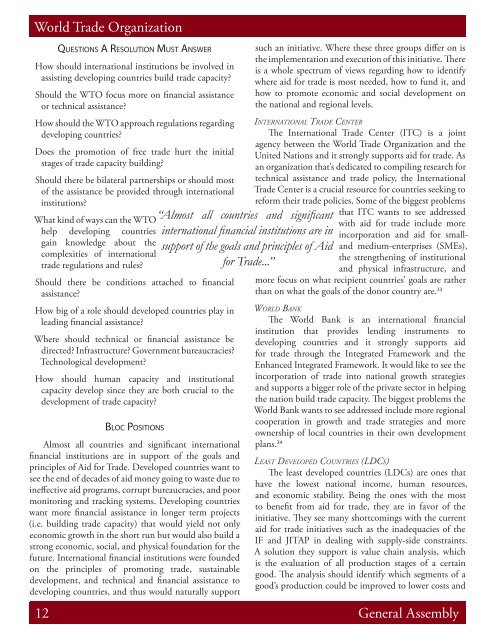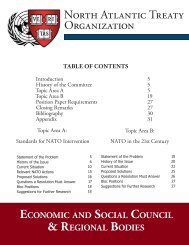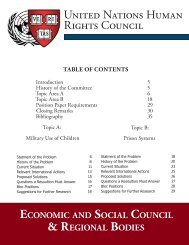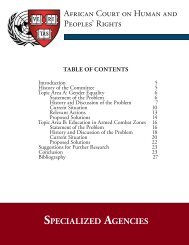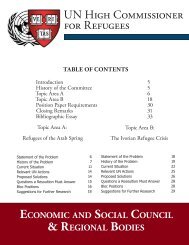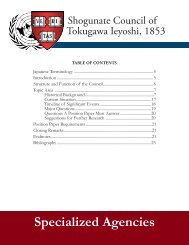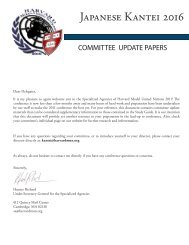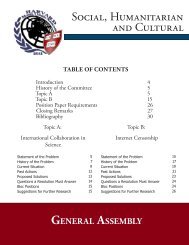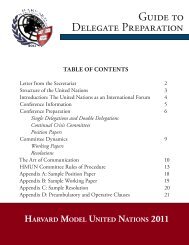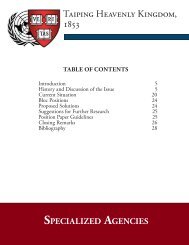World Trade Organization - Harvard Model United Nations
World Trade Organization - Harvard Model United Nations
World Trade Organization - Harvard Model United Nations
Create successful ePaper yourself
Turn your PDF publications into a flip-book with our unique Google optimized e-Paper software.
<strong>World</strong> <strong>Trade</strong> <strong>Organization</strong><br />
Questions A Resolution Must Answer<br />
How should international institutions be involved in<br />
assisting developing countries build trade capacity?<br />
Should the WTO focus more on financial assistance<br />
or technical assistance?<br />
How should the WTO approach regulations regarding<br />
developing countries?<br />
Does the promotion of free trade hurt the initial<br />
stages of trade capacity building?<br />
Should there be bilateral partnerships or should most<br />
of the assistance be provided through international<br />
institutions?<br />
What kind of ways can the WTO<br />
help developing countries<br />
gain knowledge about the<br />
complexities of international<br />
trade regulations and rules?<br />
Should there be conditions attached to financial<br />
assistance?<br />
How big of a role should developed countries play in<br />
leading financial assistance?<br />
Where should technical or financial assistance be<br />
directed? Infrastructure? Government bureaucracies?<br />
Technological development?<br />
How should human capacity and institutional<br />
capacity develop since they are both crucial to the<br />
development of trade capacity?<br />
Bloc Positions<br />
Almost all countries and significant international<br />
financial institutions are in support of the goals and<br />
principles of Aid for <strong>Trade</strong>. Developed countries want to<br />
see the end of decades of aid money going to waste due to<br />
ineffective aid programs, corrupt bureaucracies, and poor<br />
monitoring and tracking systems. Developing countries<br />
want more financial assistance in longer term projects<br />
(i.e. building trade capacity) that would yield not only<br />
economic growth in the short run but would also build a<br />
strong economic, social, and physical foundation for the<br />
future. International financial institutions were founded<br />
on the principles of promoting trade, sustainable<br />
development, and technical and financial assistance to<br />
developing countries, and thus would naturally support<br />
“Almost all countries and significant<br />
international financial institutions are in<br />
support of the goals and principles of Aid<br />
for <strong>Trade</strong>...”<br />
such an initiative. Where these three groups differ on is<br />
the implementation and execution of this initiative. There<br />
is a whole spectrum of views regarding how to identify<br />
where aid for trade is most needed, how to fund it, and<br />
how to promote economic and social development on<br />
the national and regional levels.<br />
International <strong>Trade</strong> Center<br />
The International <strong>Trade</strong> Center (ITC) is a joint<br />
agency between the <strong>World</strong> <strong>Trade</strong> <strong>Organization</strong> and the<br />
<strong>United</strong> <strong>Nations</strong> and it strongly supports aid for trade. As<br />
an organization that’s dedicated to compiling research for<br />
technical assistance and trade policy, the International<br />
<strong>Trade</strong> Center is a crucial resource for countries seeking to<br />
reform their trade policies. Some of the biggest problems<br />
that ITC wants to see addressed<br />
with aid for trade include more<br />
incorporation and aid for smalland<br />
medium-enterprises (SMEs),<br />
the strengthening of institutional<br />
and physical infrastructure, and<br />
more focus on what recipient countries’ goals are rather<br />
than on what the goals of the donor country are. 33<br />
<strong>World</strong> Bank<br />
The <strong>World</strong> Bank is an international financial<br />
institution that provides lending instruments to<br />
developing countries and it strongly supports aid<br />
for trade through the Integrated Framework and the<br />
Enhanced Integrated Framework. It would like to see the<br />
incorporation of trade into national growth strategies<br />
and supports a bigger role of the private sector in helping<br />
the nation build trade capacity. The biggest problems the<br />
<strong>World</strong> Bank wants to see addressed include more regional<br />
cooperation in growth and trade strategies and more<br />
ownership of local countries in their own development<br />
plans. 34<br />
Least Developed Countries (LDCs)<br />
The least developed countries (LDCs) are ones that<br />
have the lowest national income, human resources,<br />
and economic stability. Being the ones with the most<br />
to benefit from aid for trade, they are in favor of the<br />
initiative. They see many shortcomings with the current<br />
aid for trade initiatives such as the inadequacies of the<br />
IF and JITAP in dealing with supply-side constraints.<br />
A solution they support is value chain analysis, which<br />
is the evaluation of all production stages of a certain<br />
good. The analysis should identify which segments of a<br />
good’s production could be improved to lower costs and<br />
12<br />
Specialized General Assembly Agencies


